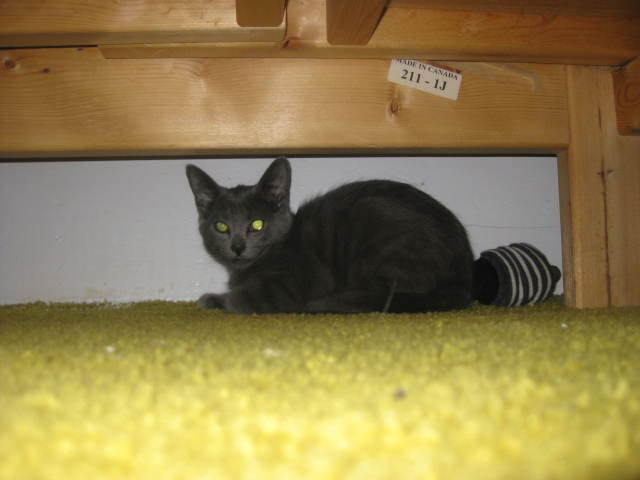QuestionOn Sunday I bought two female kittens from a humane society
and they both are scared and run away whenever someone comes near. The one female enjoys being petted and likes to play but her sister is scared of everyone and everything. We will pick them up and they just want to run away. I just want them to be cuddely and loving cats. They were born in the wild for 6 weeks of their life then were brought to the humane society. Whats should i do?
AnswerJessica,
Did the Humane Society not disclose that these kittens were born in the wild and lived as feral cats for 6 wks of their lives? How old are they? Most shelters won't allow kittens to be adopted until they're at least 8-10 wks old, so if they're young, then the majority of their lives has been outside, which can make for a very different cat--at least initially.
First off, any cat that lives as a feral will take a longer time to adjust and grow accustomed to people. They are not going to be your cute, cuddly kittens that love to be held and loved. They are typically skittish, shy, fearful of others, uncertain of their environment, and not trusting of anyone or anything. It is definitely going to take more work on your part to get them more comfortable and at ease with people. I think that most shelters allow you to return animals within a few days if they're not working out, so that may be an option if you're not willing to work with them or spend the time to get them socialized. Then you could pick out some other kittens that weren't feral.
However, just because the kittens were feral for 6 wks, doesn't mean they're not trainable. The younger they are, the more trainable they are and the quicker they will learn. Even if they're older kittens, they will probably become socialized fairly easily since they were only feral x6 wks. They will need a lot of attention and discipline, though, so if you work all day, and/or other family members aren't around all day, then it could take longer and will be trickier.
Basically, with feral cats, they will need to learn to trust humans. Because they've lived in the wild without any human interaction, they don't know that human interaction can be safe and can be good. You will need to start off slowly, as too much too quickly will just confuse them. I would keep them in a small room---a "safe room" for them. Putting them in a safe room allows them to develop some comfort in their surroundings. They don't have a huge room or house to explore or wonder who or what's there, and they have each other to comfort as well. The smaller room will allow them to get used to the comings and goings of the house, the noises, the voices of their human owners. This room is usually a bathroom or spare bedroom. Make sure their litterbox and food and water bowls are in there, as well as several toys. Make it a point to spend several hrs a day in the room with them. You want them to get used to being in the same room with you, learning that you are not a threat to them. Initially, just go into the room and sit on the floor. They will run from you, but that's okay. Just talk to them. Or talk to yourself. The point is to let them hear your voice and get used to your voice. You want them to associate your voice with no harm. You should always talk to them in a very soft, light voice. Too loud and too firm, and it will scare them.
After you've done the above for a wk or two (remember, it depends on how old your kittens are. If they're 8-12 wks, then you will probably just need to do the above step for 5-7 days. If they're older, you may need to do it for 1-2 wks, and their behavior will tell you if you need to stay at that step longer), the next step is to hold both of them in your lap while you talk to them. If it's just you, then you need to hold them at different times, but if there's others in your home, you can both go in there and hold them at the same time, 1 on each lap. Again, hold them and talk to them. If they struggle, don't let them go. If you have to scruff them, go ahead and scruff them (the mother cat scruffs her cats when she carries them somewhere or is trying to train them, and it actually relaxes them). But only scruff them if they struggle and/or try to get away. And remember, that scruffing done correctly will actually cause the kittens to relax. And remember, no yelling, no shouting. Just soothing, soft tones in your voice. Touch them all over the head--stroke their head, their ears, rub their ears, stroke their neck, around their face, and always be talking to them. Don't let them escape off your lap, keep them scruffed if you have to, but you should always be stroking their head while you're scruffing them. You also want to start enticing them to eat from your hand. Give them some treats and see if they come and eat out of your hand. If they don't, keep offering the treats to them. Start out laying the treats on the floor in front of you. Once they're used to that (a day or two), bring the treats closer to you (another day or two), and finally, have the treats in your hands for them to come eat them.
After they've graduated from the above step, then allow them to come out, but in a very small area (maybe get a crate or kennel, but it's got to be large enough so they can run around and play, and it's got to be open on all sides so they can see things going on). The whole point of this step is to introduce them to the rest of the house and other people (if any) and just the overall sites and sounds of the house. Move all their toys and their food and water bowl and litterbox out to this area while they're out there. You don't have to sit with them at this point, but go about your regular activities, frequently stopping to pet them and talk to them. The point of this step is to expose them to other noises and people and the rest of the house, while learning that no harm is going to come to them. By this point, they should feel comfortable enough with you to know that you're not going to hurt them. They shouldn't be so skittish anymore, and definitely shouldn't run when they see you or you hold them. But, that said, since they're now in a bigger area of the house, any strange noise or sound may send them running to hide until they get used to the sounds of the house. If that happens, let them be for a little while, because they need to know they have a safe place to retreat to, but don't let them stay hidden for long, because that is just reinforcing their behavior of running away.
If at any point during these steps, you notice both of them or either one may be stressed or particularly upset, back up one step and start over. You can't rush feral kittens into doing anything, and the main issue is to get them to trust you. Always keep this in mind as you're working with them. Once they trust you and know you won't hurt them, the rest of the training should be easy. Once they trust you, then you can start doing more things with them. Remember that if you're holding them and they struggle to get out of your grasp, scruff them. But ensure you're still stroking and petting them and talking to them soothingly. At night, until they're completely comfortable with your home and you, return them to their small room. Feral kittens can be destructive, as they've never had any discipline either! So, have a spray bottle filled with water and white vinegar ready. When they do something bad and you catch them in the act, squirt them, but never in the face/eyes, and try not to let them see it comes from you. You want to make it seem as if that spray of water just came out of the air! You don't want to make yourself look like a bad guy. I recommend using a hissing sound, like a snake, as that noise scares them. So, as you spray, make a "sssttt" sound, and they will quickly learn to respect that sound and the water bottle.
These are some suggestions to get you started with your 2 kittens. Remember, though, training feral kittens will take time and patience, and you've got to have lots of time to spend with them. If you really don't have several hrs a day to spend with them, getting them used to your voice and your home, then they may not be the best match for you. But it is important to know, though, that young kittens will be able to be socialized, and eventually will come around and learn to trust you and love you. However, remember that not all cats like to be held or loved. Some are just loners, and that's just the way they are--feral or not. So that is something you need to realize as well--that no matter how much you work with them, they simply may be the type of cat that just wants to be independent and not cuddled and loved.
Good luck, and let me know if I can be of any further help.
Savannah

 Rain
Question
my cat
Hi, i was wondering if you could help m
Rain
Question
my cat
Hi, i was wondering if you could help m
 Kitten breed
Question
Minnoo
Dear Sir,
I brought home a female kitte
Kitten breed
Question
Minnoo
Dear Sir,
I brought home a female kitte
 Two Kittens from different litters?
Question
Ginger Female
We wanted to get 2 kitten
Two Kittens from different litters?
Question
Ginger Female
We wanted to get 2 kitten
 Shaking? Or is it from her purr?
Question
Prada Under our bed
We just adopted a Himalaya
Shaking? Or is it from her purr?
Question
Prada Under our bed
We just adopted a Himalaya
 Bald spot on my cats nose
Question
bald spot
Hello Jessica,
Today I notic
Bald spot on my cats nose
Question
bald spot
Hello Jessica,
Today I notic